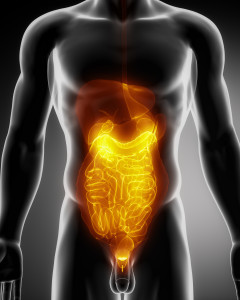Irritable Bowel Syndrome
What Is Irritable Bowel Syndrome?
 Irritable bowel syndrome (IBS) is very common and it is estimated that 10-20% of people experience symptoms of IBS. It is also known as spastic colon or functional bowel. It usually affects the colon, but other parts of the intestinal tract can be affected.
Irritable bowel syndrome (IBS) is very common and it is estimated that 10-20% of people experience symptoms of IBS. It is also known as spastic colon or functional bowel. It usually affects the colon, but other parts of the intestinal tract can be affected.
Causes
Cause is unclear. It is thought that abnormal contractions of the colon and intestines may cause the symptoms of IBS, but it is unclear whether the spasms are a cause or a symptom of IBS. Some people develop IBS after a severe gastrointestional infection. Stress and anxiety are known to affect the intestine, and can worsen the symptoms of IBS. It is thought that heightened sensitivity of the intestines to normal sensations.
Signs and Symptoms
Patients with IBS present with a wide variety of symptoms. Cramping abdominal pain is common. Location and character of pain varies, and can be effected by stress and diet in some people. Pain is sometimes improved with a bowel movement. Patients have altered bowel movements, some patients have diarrhea, some have constipation, and some fluctuate between both.
Diagnosis
IBS is a diagnosis of exclusion, and unfortunately there is no single test to diagnose IBS.. Typically a colonoscopy is performed, as well as an upper endoscopy, to rule out Celiac disease, Crohn’s, Ulcerative colitis, microscopic colitis, structural lesions, and other intestinal abnormalities that can cause GI symptoms. Depending on the patient’s symptoms, other testing may include capsule endoscopy, blood work, stool studies, food allergy testing, and sometimes other testing as well. If these tests are negative, and symptoms are consistent with IBS, a diagnosis of IBS is made. Alarm symptoms that are typically not associated with IBS are rectal bleeding, nocturnal bowel movements or pain, continually worsening pain, weight loss, or abnormal test findings.
There are four subtypes of IBS. These are IBS with constipation, IBS with diarrhea, mixed IBS, and unsubtyped IBS. Patients who have IBS with constipation have hard or lumpy stools >25% of the time. Likewise, patients who have IBS with diarrhea have loose or watery stools >25% of the time. Mixed IBS patients have stools that fluctuate between diarrhea and constipation, having >25% of both types of stools. Unsubtyped IBS patients do not fall into the other categories.
Treatment
There is no specific diet that is recommended for all IBS patients. For some patients, gas-producing foods cause increased symptoms. For others, dairy or fatty foods are triggers. Keeping a food journal to identify symptom-producing foods is often helpful. A high-fiber diet is recommended for IBS patients, as this can help increase bowel movement regularity. However, some patients note increased gas, bloating, or abdominal discomfort with increased fiber intake. Patients often benefit from regular exercise. Stress management can significantly improve symptoms as well. There are many medications that are used to manage the symptoms of IBS, including anti-diarrheals, anti-spasmotics, and various stool softeners or laxatives. Treatment is tailored to the individual patient and his or her symptoms.
